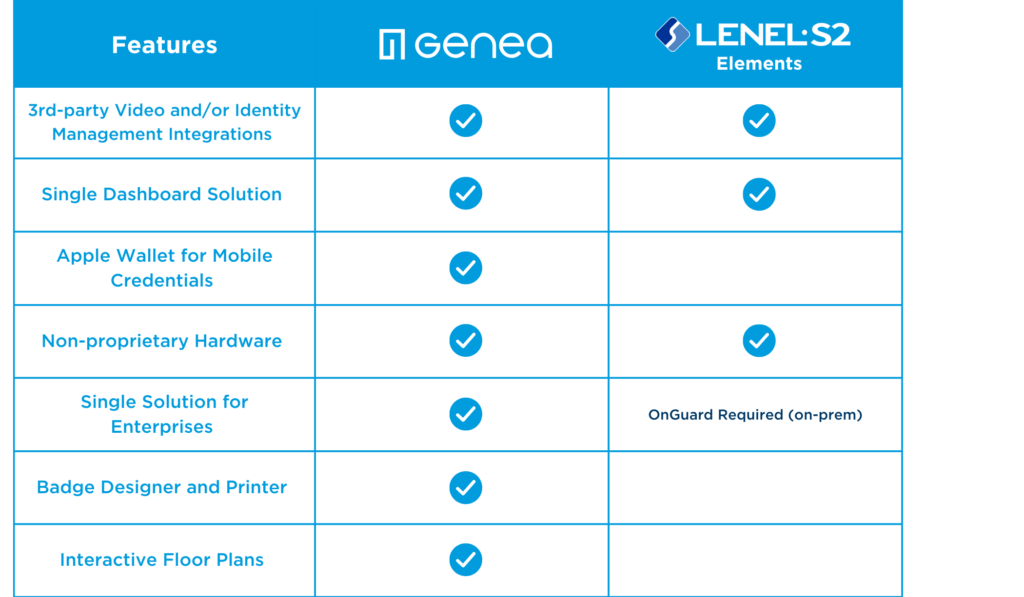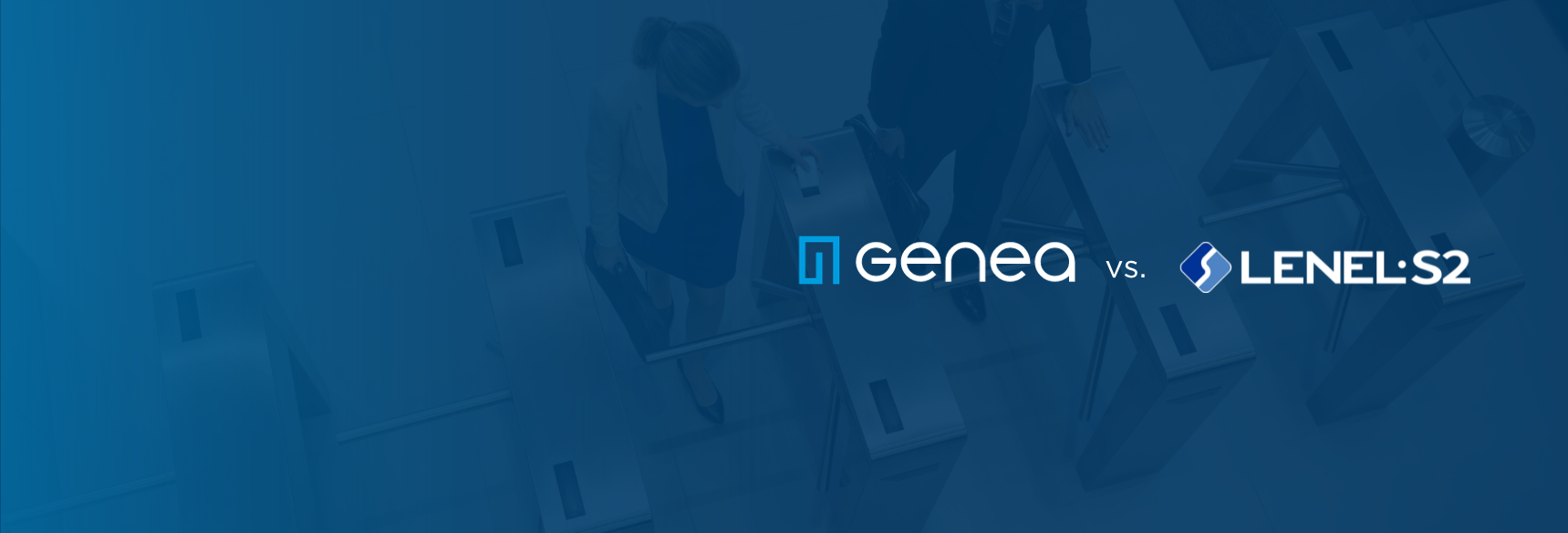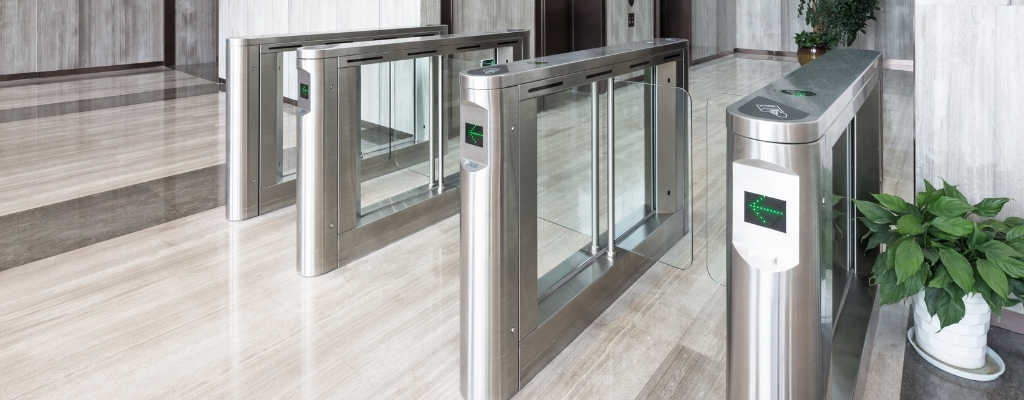For the better part of the last twenty years, LenelS2 has dominated the access control industry. Its on-premises access control systems were widely adopted by security teams for provisioning key cards, creating activity reports and their interoperability with video surveillance.
Recently, however, LenelS2 has had trouble keeping pace with new access control providers, in particularly those offering cloud-based solutions. To compete with cloud-based security manufacturers like Genea, Avigilon Alta (formerly Openpath), Brivo and Verkada, Lenel released a cloud-based system of its own known as Lenel Elements.
In this article, we’ll take a look under the hood, exploring how LenelS2’s Elements compares to other cloud-based access control systems.
In this article, you’ll find:
- The History of Lenel
- How Lenel Elements Works
- How Much a LenelS2 Access Control System Costs
- Review of LenelS2 Compared to its Competitors
- Alternatives to Lenel
About LenelS2
Lenel was founded in 1991 by Louis T. Minner and John D. Campoli, before later merging with S2 Security Corporation in 2018. Eventually, the company would be acquired by the security and HVAC manufacturer, Carrier.
As LenelS2 evolved, it built its reputation as a reliable security manufacturer. Its on-premises access control and video security were the backbone of the company. However, as technology evolved, cloud-based security providers challenged Lenel’s position and market share.
Currently, the manufacturer has several main product lines, including include:
- OnGuard – An on-premises access control system capable of integrating with other business systems.
- NetBox – An on-premises system that helps security administrators manage access through a web browser.
- NetVR & VRx – LenelS2’s proprietary video management software
Elements is LenelS2’s latest effort to make up ground in the cloud-based arena. Let’s explore what Elements has to offer.
How does Lenel Elements Work?
The cloud has transformed the ease with which security teams can integrate disparate systems. Solutions like video management and notification systems can now be integrated with little more than an API token – a stark contrast to the expensive process of integrating Lenel’s on-prem access control.
Both of LenelS2’s access control systems operate through proprietary nodes. Netbox Nodes are the control panels that connect to proximity readers and locks. IT and security teams must use nodes in order to scale their access control system. Consequently, the setup of this system is much more complex than other cloud-based access control systems.
Finally, LenelS2 customers receive several important integrations with third-party products, including card readers, controllers, video monitoring systems, video intercoms. However, as we’ll explore later, Elements is not compatible with many third-party integrations.
Benefits of a LenelS2 Access Control System
Elements is LenelS2’s answer to the wave of cloud-based access control systems cropping up. The company claims that their system is both simple and scalable, while touting several key features:
- Mobile-first– Users can leverage LenelS2’s BlueDiamond mobile app instead of plastic key cards.
- Cloud-based– For small and medium businesses, Elements is a standalone product.
- Real-time hardware events– Monitor the system from anywhere, in real-time.
- Guest Pass- Issue temporary access to people without issuing a physical badge.
- Non-proprietary Hardware- Mercury hardware supported, but limited to 64 readers, 4 controllers and 16 cameras per site. It’s also capped at 5,000 access events per day.

Some of these benefits come with significant caveats. For example, the Guest Pass feature does not provide badge customization and printing. The customization of role-based temporary credential also is not possible. Additionally, though, Lenel Elements works for small and medium-sized businesses, it requires enterprises to store more hardware.
The Drawbacks of Lenel Elements
Despite making headway, Lenel Elements is impractical for some companies, including enterprises and other multi-location businesses like co-working spaces, college campuses and hospitals. These are some of the drawbacks:
No Third-Party Video Integrations
One of the major drawbacks, according to the security news industry outlet, IPVM, is that Lenel Elements is not equipped with third-party video integrations. Instead, Elements relies on its proprietary video management systems called NetVR and VRx. If you already have a camera setup, then you’ll have to replace all your hardware. Bottom line – Without security camera integrations, hardware will be an added expense and system flexibility decreases.
No Identity Management Integrations
One of the most significant time-saving features of a cloud-based access control system is its provisioning. When integrated with identity management platforms like G-Suite, Okta or Microsoft Entra ID, the manual process of adding and removing users becomes much simpler. Security teams can effectively automate their provisioning and distribution with a robust system—this is not possible with Elements.
Take a look at the case study with G&J Pepsi to see how their Cisco Meraki and Microsoft Entra ID systems are automating security.
Complicated for Enterprise Access Control
With the increased prominence of the cloud, the security industry has begun transitioning to “single pane of glass” solutions. These solutions grant total oversight across various software tools security teams rely on. Unfortunately for enterprise users (or any organization needing a multifunctional access control system), Elements requires an add-on called OnGuard. LenelS2 markets this as a way to “run the on-premises OnGuard system at [the enterprise’s] headquarters” while satellite offices are secured by Elements. However, there is no benefit to maintaining the extra costs of an on-premises solution. Effectively, Elements for enterprises is not completely cloud based.
Dated Dashboard Design
Elements’ dashboard design and features also seem dated. Though features like event monitoring are available, it’s not clear that much platform customization exists. Intuitive features of the platform also seem to be lacking.
Lack of Visitor Management
One of the most important aspects IT and security teams must consider is visitors. Elements comes with a way to provision temporary credentials to users’ guests. However, this isn’t a complete solution. Providers like Genea offer an integrated, out-of-the-box visitor management feature set. This includes things like pre-registration workflows, e-document signing, health questionnaires and more.
Should I get a LenelS2 Access Control System?
LenelS2 has a longstanding reputation and has gained user trust over the last two decades. The challenge for LenelS2 (and their customers) is the rapid transformation of the security industry. The question remains: Will LenelS2 modernize its platform enough to not just withstand these changes but excel basic requirements?
While customers already using an LenelS2’s on-premises system may be tempted to stick with the manufacturer, Genea makes it possible to easily migrate without paying for expensive hardware installations. Find out more by watching our video about Access Control takeovers.
Lenel Elements vs. Genea Security
There are a lot of considerations to keep in mind when shopping for an access control system. But ultimately, your access control system should make things simpler and automate your manual daily tasks. Genea does this by providing features that unify and automate security.
User-Friendly Interface: Genea Security is known for its intuitive and user-friendly interface. The system is designed with a focus on simplicity, making it easy for admins to quickly adapt and utilize all the features. This user-friendly design can reduce the learning curve and enhance the efficiency of your security personnel.
Scalability and Flexibility: Genea Security offers a highly scalable solution. It can easily accommodate the changing needs of your organization as it grows. Whether you’re a small business or a large enterprise, Genea’s system can adapt to your requirements without a major overhaul.
Cloud-Based, Non-proprietary Access Control: Genea Security is a cloud-based system built on Mercury-based hardware. The advantage of this kind of system is twofold. Firstly, cloud-based access control allows administrators to manage and monitor access control remotely, making it ideal for organizations with multiple locations or off-site management needs. Lenel Elements, on the other hand, does not offer the same level of convenience for remote management.
Second, non-proprietary hardware gives security teams more system flexibility. As an administrator, you can change software providers without installing new hardware. Further, non-proprietary hardware makes it easy to migrate from on-premises access control to the cloud. Since LenelS2 also uses non-proprietary hardware, transitioning to Genea is easy with an access control takeover.
Integration Capabilities: Genea’s platform allows for seamless integration with other systems and technologies within your organization, such as video surveillance, alarm systems and visitor management. This level of integration can enhance overall security and streamline operations.
Modern Mobile Access: Genea Security offers modern mobile access solutions that are easy to implement. This includes app-based mobile and Apple wallet credentials, providing users with a convenient and contactless way to enter secured areas. Mobile access reduces the need for physical cards or keys, enhancing security and reducing operational costs. Genea’s the only cloud-based provider who integrates with employe badge in Apple Wallet, so iPhone users can add their digital credentials.
While both Genea Security and Lenel Elements are viable options for access control, Genea is a compelling choice for organizations of all sizes. When it comes to securing your premises, Genea Security offers a comprehensive and efficient solution that can adapt to your evolving security needs.
For more information, feel free to contact a Genea representative.






